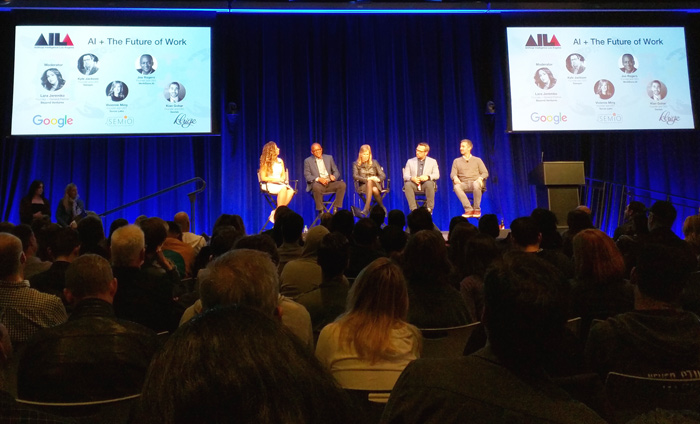AI LA and Google Co-Host “The Future of Work” Panel

Omni Nano representatives attended “AI + The Future of Work” at Google’s Venice HQ this evening. The event, presented by AI LA (Artificial Intelligence Los Angeles), brought together a panel of AI experts and futurists to discuss how technology will impact the future work landscape.
AI LA describes the event, which was live-streamed on Facebook, as a conversation about “how artificial intelligence and robotics will disrupt the workplace, but also create new opportunities.” They go on to comment, “It’s not a dystopian future as depicted in entertainment or the press.”
Tonight’s panel included Dr. Vivienne Ming (Chief Executive of Socos Labs), Kian Gohar (Founder/CEO of Geolab), Kyle Jackson (Founder/CEO of Talespin), and Joe Rogers (Founder/CEO of WorkDone.AI), and was moderated by Lara Jeremko (Founder/Partner of Beyond Ventures).
Workers around the world fearful of losing their jobs to automation are asking themselves, “How can I future-proof my career?” All of the panelists agreed that the most valuable assets in the future workforce are creativity, emotional skills, and purpose. Based on her research, Dr. Ming said that soft skills like metacognition are even more important than hard skills like Adobe suite proficiency — and even more predictive of good job performance. Mr. Jackson discussed the “half-life” of such hard skills, forecasting that in each of our lifetimes we will have dozens of “careers,” by today’s definition, and will be doing more complex work in a more gig-like fashion.
Mr. Gohar predicts that this so-called “gig economy” will also change the physical landscape of the workplace. While groups of workers are commonly colocated today, by 2045 individual workers will use autonomous vehicles to move to various locations throughout the workday. The way we work will be different because we’ll be using different technologies to communicate with each other — much like we communicated and worked differently in the 1980s and 1990s than we do today. Mr. Rogers went on to forecast that the amount of work we do will also decrease as more basic tasks are automated, allowing us more room to “live” and focus on what we as individuals can do for each other and for the world.
To watch the full panel and Q&A, click here.







